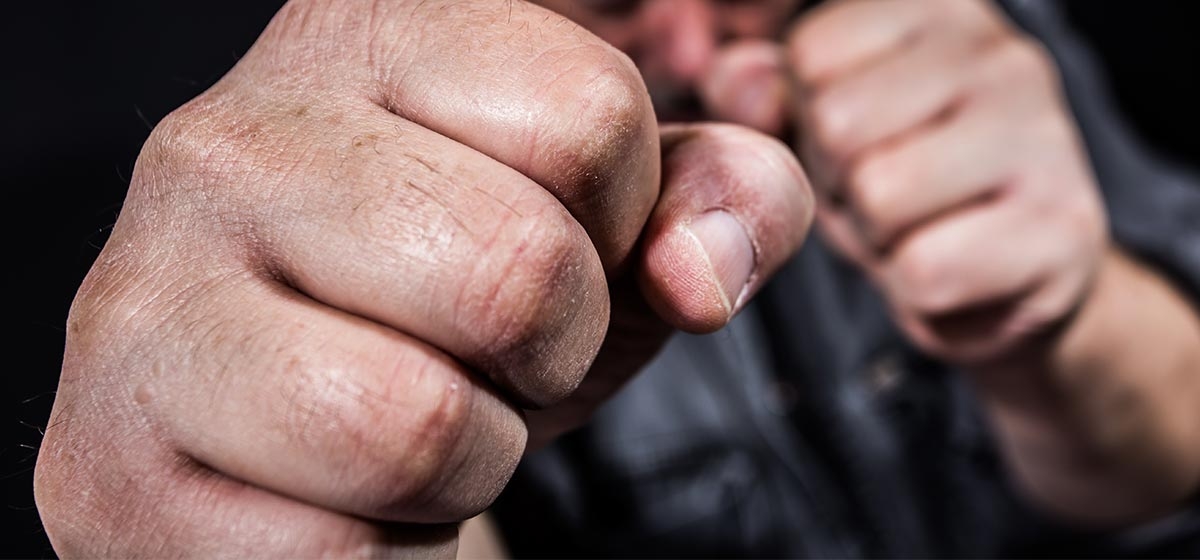Don’t Even Think About Crossing a Hillbilly

We’ve talked about several obstacles to success in middle class Ohio for migrants from southeastern Kentucky: they had horrible accents and they tended to dress funny. But the biggest obstacle was the most difficult to overcome: their behavior.
As I’ve noted, Scots-Irish immigrants to America brought with them a constellation of characteristics. These included an extreme independence of spirit, intense family loyalty, distrust of government or any other authority, and a hair temper prone to sudden violence. It was this last trait that was both the most difficult to change and the most likely to stand in the way of their success.
Back in Jackson, Kentucky, J.D. Vance’s family were “hillbilly royalty,” and the main quality that qualified them as royalty was their knee-jerk violence. You just didn’t mess with the Blantons of Breathitt County. (Mamaw was a Blanton.)
So renowned were the Blantons for violence that one episode actually made the pages of the distant New York Times: the Blanton son of a local judge killed a man on election day in 1909.)
On another occasion a Blanton uncle believed that a truck driver had insulted his mother. (There was some question about this—the driver had referred to the uncle as an SOB.) Cutting through the ambiguity (as it were), the uncle grabbed a power saw and began carving the driver up.
Closer to home, there is this story. One evening when Mamaw was twelve years old (i.e., the year before she began walking out with Papaw), Mamaw looked out the window and saw two miscreants in the act of stealing the family milk cow. Mamaw grabbed a rifle and began firing away, hitting one man while the other hightailed it out of sight. Realizing that the first fellow had only been wounded, Mamaw was in the process of finishing him off when, fortunately, a relative intervened.
True, all that happened in southeastern Kentucky. The trouble was that Papaw and Mamaw brought those same violent proclivities with them to Middletown, Ohio. Vance cites numerous examples, but here are just a few:
The drugstore incident. One time when J. D. Vance’s Uncle Jimmy was a little boy he went into a drugstore and began playing with an expensive toy. The angry store clerk threw Jimmy out. Mamaw and Papaw charged into the store and Papaw picked up the toy and slammed it to the floor, smashing it to pieces. Papaw then began throwing other toys around the store while Mamaw screamed at Papaw to beat the clerk up (but in much more graphic language).
Papaw advanced menacingly on the clerk and told him that if he ever spoke to Jimmy again Papaw would “Break your f!#*king neck.” Mamaw and Papaw then calmly continued their shopping trip as though nothing had happened.
The immolation incident. Papaw was for much of his life a drunk, and Mamaw was, in Vance’s word, “a violent non-drunk.” Angry at Papaw’s drinking, Mamaw once waited until Papaw took a nap, then poured gasoline on him and set him on fire.
Bev. The violence and instability in the Middletown home of Mamaw and Papaw had a devastating effect on Vance’s mother, Bev. She couldn’t maintain a romantic relationship, taking up with so many men Vance lost count. She became depressed and attempted suicide. She was a drug addict whose behavior was often bizarre.
Once, Bev threatened to kill young J. D., who ran off and hid in a stranger’s home. Bev broke the lady’s door down and yanked her son out kicking and screaming. The police arrived and dragged Bev away in handcuffs.
In other words, the kinds of behavior that, in Jackson, Kentucky, conferred “hillbilly royalty” status on the family, took on a very different and much darker hue in Ohio: people who acted like that were outlaws.
My grandparents were no strangers to hillbilly violence, having grown up near Bloody Harlan. Granddad was raised in a no-plumbing cabin situated halfway up a mountain just north of Barbourville, Kentucky. There were no roads up to the place, so whenever we visited Great Grandma, we parked down by the creek and hiked up through the woods.
(By the way, I always thought that place was called Darr Holler because, well, that’s what everybody called it. It wasn’t until I was in my twenties that I realized it was actually Dyer Hollow, Dyer being my grandfather’s last name.)
The Dyers had their own private coal mine a bit further up the mountain, a useful thing to have in the middle of the winter. Unfortunately, other people knew about the mine and weren’t shy about helping themselves.
So Granddad kept a shotgun leaning just inside the back door. When the hounds set up a howl, suggesting that somebody was, in fact, helping himself to come coal, Granddad would grab the shotgun and run out back blasting away. When folks are stealing your coal, you shoot first and ask questions later.
But when Granddad and Grandma left Barbourville for Ohio, this sort of behavior stayed behind in Kentucky. They noticed right away that people in Springfield simply didn’t act like that, and they did their best to learn other mechanisms for coping with anger and insults.
Both Grandma and Granddad had tempers, but they learned to turn those tempers only on each other, never on non-family members and rarely on family—not even on their annoying grandson. Not only were my grandparents not violent people, they were the least violent people I knew. Like the issue of dress, they knew they couldn’t rely on their own instincts to avoid violence, but instead, by dint of sheer willpower, became more-Catholic-than-the-Pope: more peaceful than the Ohioans.
J. D. Vance grew up in Ohio, but in the atmosphere of southeastern Kentucky. His grandparents talked funny, dressed funny, and exercised tempers that took them from nothing to extreme violence in a nanosecond. I grew up in Ohio, and in the atmosphere of Ohio. My grandparents talked funny (but not in public), dressed like Ohioans, and lived lives so peaceful that no one in southeastern Kentucky would have believed they were actually hillbillies.
Over the next few weeks we’ll reflect on the lessons Vance hopes we will take from Hillbilly Elegy, and that will bring this series to a close.
Next up: On Hillbilly Elegy, Part VIII





